Legal, Ethical Considerations in Travel and Tourism Sector Report
VerifiedAdded on 2020/06/04
|14
|3880
|46
Report
AI Summary
This report provides a detailed overview of the legal and ethical considerations within the travel and tourism sector. It begins by outlining the legal and regulatory frameworks, including consumer protection, health and safety, and transport laws pertaining to surface, sea, and air travel. The report then delves into specific legislation, such as the Package Travel Regulations and data protection acts, crucial for businesses operating in the UK. The analysis extends to health, safety, and security principles, emphasizing employer and employee responsibilities, and the importance of duty of care and occupier liability. The report also covers legislation relating to equality and discrimination, including the Racial Discrimination Act, Human Rights Act, and Sex Discrimination Act. Furthermore, it examines contract and consumer protection legislation, such as the Unfair Contract Terms Act and the Sale of Goods Act, ensuring fair practices in customer interactions. Finally, the report touches upon ethical dilemmas and corporate social responsibility (CSR) policies within the industry. The report uses the practices of Thomas Cook and Elegant Hotel to provide real-world examples.
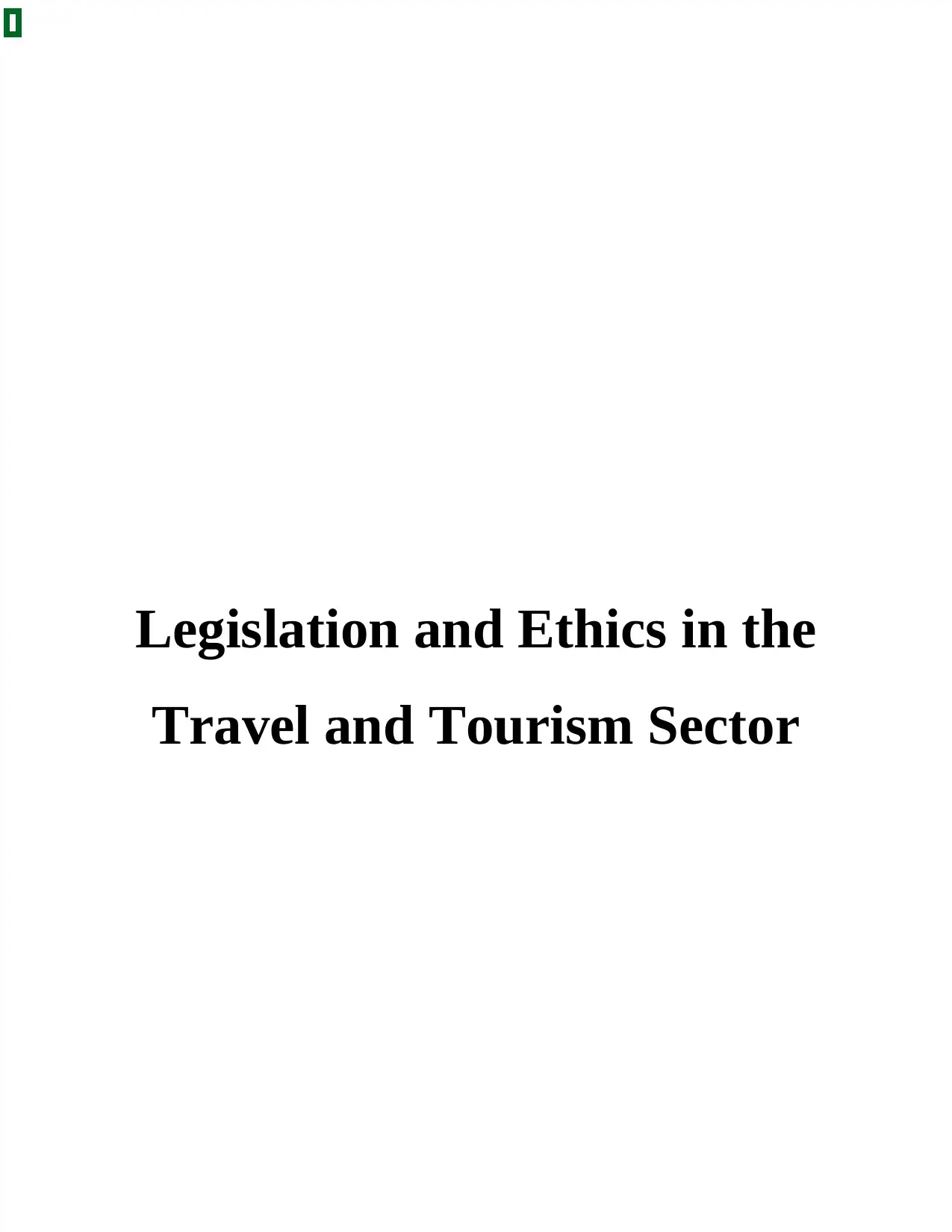
Legislation and Ethics in the
Travel and Tourism Sector
Travel and Tourism Sector
Paraphrase This Document
Need a fresh take? Get an instant paraphrase of this document with our AI Paraphraser
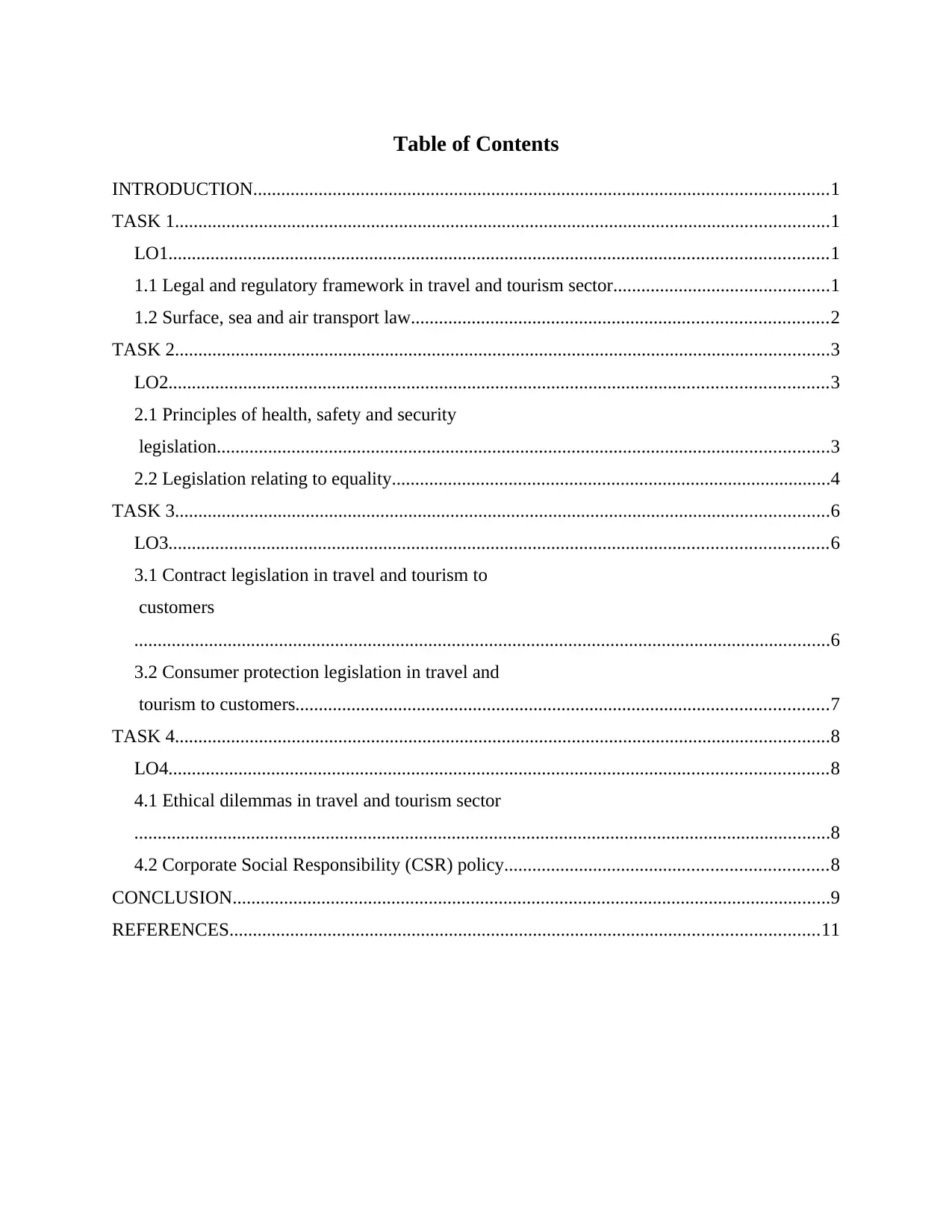
Table of Contents
INTRODUCTION...........................................................................................................................1
TASK 1............................................................................................................................................1
LO1.............................................................................................................................................1
1.1 Legal and regulatory framework in travel and tourism sector..............................................1
1.2 Surface, sea and air transport law.........................................................................................2
TASK 2............................................................................................................................................3
LO2.............................................................................................................................................3
2.1 Principles of health, safety and security
legislation...................................................................................................................................3
2.2 Legislation relating to equality..............................................................................................4
TASK 3............................................................................................................................................6
LO3.............................................................................................................................................6
3.1 Contract legislation in travel and tourism to
customers
.....................................................................................................................................................6
3.2 Consumer protection legislation in travel and
tourism to customers..................................................................................................................7
TASK 4............................................................................................................................................8
LO4.............................................................................................................................................8
4.1 Ethical dilemmas in travel and tourism sector
.....................................................................................................................................................8
4.2 Corporate Social Responsibility (CSR) policy.....................................................................8
CONCLUSION................................................................................................................................9
REFERENCES..............................................................................................................................11
INTRODUCTION...........................................................................................................................1
TASK 1............................................................................................................................................1
LO1.............................................................................................................................................1
1.1 Legal and regulatory framework in travel and tourism sector..............................................1
1.2 Surface, sea and air transport law.........................................................................................2
TASK 2............................................................................................................................................3
LO2.............................................................................................................................................3
2.1 Principles of health, safety and security
legislation...................................................................................................................................3
2.2 Legislation relating to equality..............................................................................................4
TASK 3............................................................................................................................................6
LO3.............................................................................................................................................6
3.1 Contract legislation in travel and tourism to
customers
.....................................................................................................................................................6
3.2 Consumer protection legislation in travel and
tourism to customers..................................................................................................................7
TASK 4............................................................................................................................................8
LO4.............................................................................................................................................8
4.1 Ethical dilemmas in travel and tourism sector
.....................................................................................................................................................8
4.2 Corporate Social Responsibility (CSR) policy.....................................................................8
CONCLUSION................................................................................................................................9
REFERENCES..............................................................................................................................11

⊘ This is a preview!⊘
Do you want full access?
Subscribe today to unlock all pages.

Trusted by 1+ million students worldwide
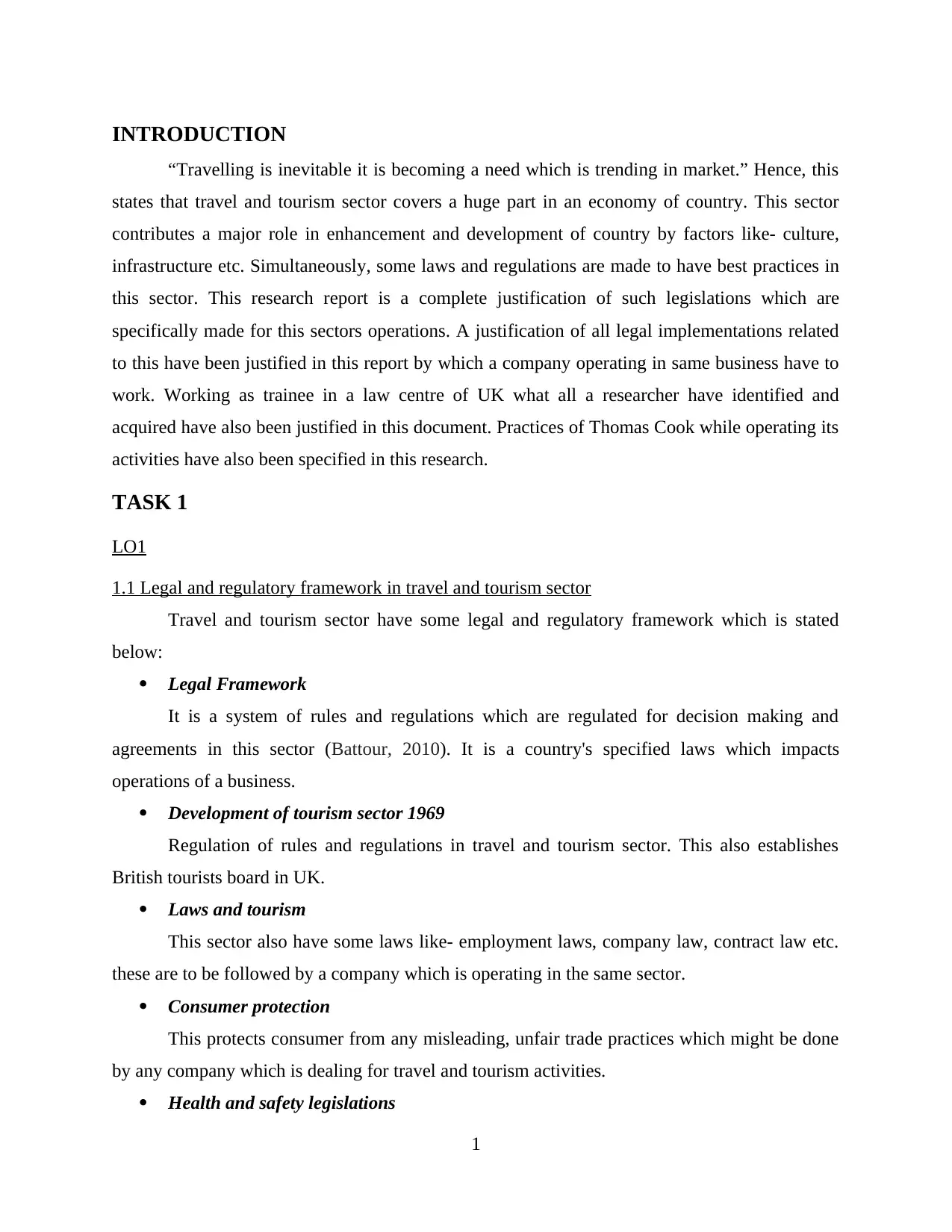
INTRODUCTION
“Travelling is inevitable it is becoming a need which is trending in market.” Hence, this
states that travel and tourism sector covers a huge part in an economy of country. This sector
contributes a major role in enhancement and development of country by factors like- culture,
infrastructure etc. Simultaneously, some laws and regulations are made to have best practices in
this sector. This research report is a complete justification of such legislations which are
specifically made for this sectors operations. A justification of all legal implementations related
to this have been justified in this report by which a company operating in same business have to
work. Working as trainee in a law centre of UK what all a researcher have identified and
acquired have also been justified in this document. Practices of Thomas Cook while operating its
activities have also been specified in this research.
TASK 1
LO1
1.1 Legal and regulatory framework in travel and tourism sector
Travel and tourism sector have some legal and regulatory framework which is stated
below:
Legal Framework
It is a system of rules and regulations which are regulated for decision making and
agreements in this sector (Battour, 2010). It is a country's specified laws which impacts
operations of a business.
Development of tourism sector 1969
Regulation of rules and regulations in travel and tourism sector. This also establishes
British tourists board in UK.
Laws and tourism
This sector also have some laws like- employment laws, company law, contract law etc.
these are to be followed by a company which is operating in the same sector.
Consumer protection
This protects consumer from any misleading, unfair trade practices which might be done
by any company which is dealing for travel and tourism activities.
Health and safety legislations
1
“Travelling is inevitable it is becoming a need which is trending in market.” Hence, this
states that travel and tourism sector covers a huge part in an economy of country. This sector
contributes a major role in enhancement and development of country by factors like- culture,
infrastructure etc. Simultaneously, some laws and regulations are made to have best practices in
this sector. This research report is a complete justification of such legislations which are
specifically made for this sectors operations. A justification of all legal implementations related
to this have been justified in this report by which a company operating in same business have to
work. Working as trainee in a law centre of UK what all a researcher have identified and
acquired have also been justified in this document. Practices of Thomas Cook while operating its
activities have also been specified in this research.
TASK 1
LO1
1.1 Legal and regulatory framework in travel and tourism sector
Travel and tourism sector have some legal and regulatory framework which is stated
below:
Legal Framework
It is a system of rules and regulations which are regulated for decision making and
agreements in this sector (Battour, 2010). It is a country's specified laws which impacts
operations of a business.
Development of tourism sector 1969
Regulation of rules and regulations in travel and tourism sector. This also establishes
British tourists board in UK.
Laws and tourism
This sector also have some laws like- employment laws, company law, contract law etc.
these are to be followed by a company which is operating in the same sector.
Consumer protection
This protects consumer from any misleading, unfair trade practices which might be done
by any company which is dealing for travel and tourism activities.
Health and safety legislations
1
Paraphrase This Document
Need a fresh take? Get an instant paraphrase of this document with our AI Paraphraser
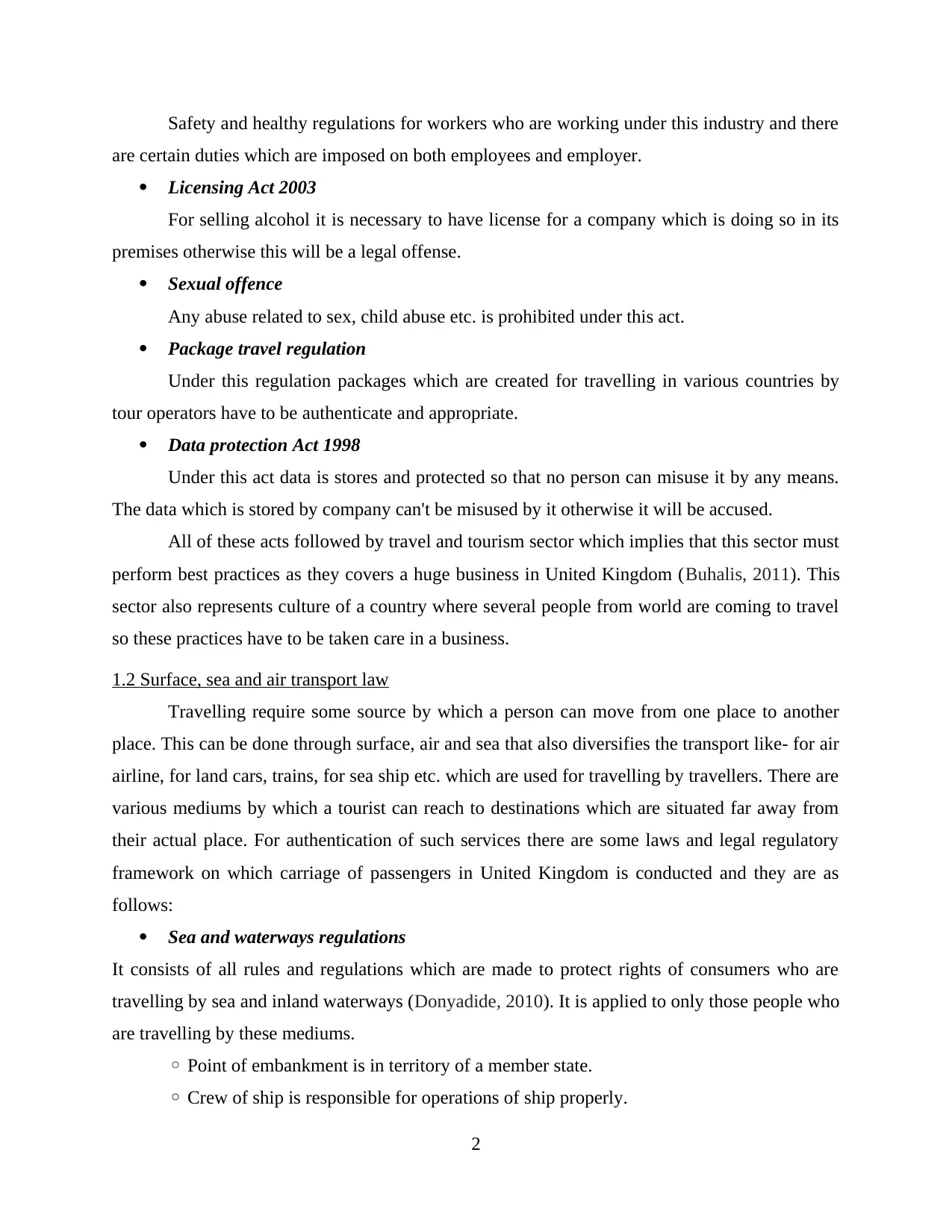
Safety and healthy regulations for workers who are working under this industry and there
are certain duties which are imposed on both employees and employer.
Licensing Act 2003
For selling alcohol it is necessary to have license for a company which is doing so in its
premises otherwise this will be a legal offense.
Sexual offence
Any abuse related to sex, child abuse etc. is prohibited under this act.
Package travel regulation
Under this regulation packages which are created for travelling in various countries by
tour operators have to be authenticate and appropriate.
Data protection Act 1998
Under this act data is stores and protected so that no person can misuse it by any means.
The data which is stored by company can't be misused by it otherwise it will be accused.
All of these acts followed by travel and tourism sector which implies that this sector must
perform best practices as they covers a huge business in United Kingdom (Buhalis, 2011). This
sector also represents culture of a country where several people from world are coming to travel
so these practices have to be taken care in a business.
1.2 Surface, sea and air transport law
Travelling require some source by which a person can move from one place to another
place. This can be done through surface, air and sea that also diversifies the transport like- for air
airline, for land cars, trains, for sea ship etc. which are used for travelling by travellers. There are
various mediums by which a tourist can reach to destinations which are situated far away from
their actual place. For authentication of such services there are some laws and legal regulatory
framework on which carriage of passengers in United Kingdom is conducted and they are as
follows:
Sea and waterways regulations
It consists of all rules and regulations which are made to protect rights of consumers who are
travelling by sea and inland waterways (Donyadide, 2010). It is applied to only those people who
are travelling by these mediums.
◦ Point of embankment is in territory of a member state.
◦ Crew of ship is responsible for operations of ship properly.
2
are certain duties which are imposed on both employees and employer.
Licensing Act 2003
For selling alcohol it is necessary to have license for a company which is doing so in its
premises otherwise this will be a legal offense.
Sexual offence
Any abuse related to sex, child abuse etc. is prohibited under this act.
Package travel regulation
Under this regulation packages which are created for travelling in various countries by
tour operators have to be authenticate and appropriate.
Data protection Act 1998
Under this act data is stores and protected so that no person can misuse it by any means.
The data which is stored by company can't be misused by it otherwise it will be accused.
All of these acts followed by travel and tourism sector which implies that this sector must
perform best practices as they covers a huge business in United Kingdom (Buhalis, 2011). This
sector also represents culture of a country where several people from world are coming to travel
so these practices have to be taken care in a business.
1.2 Surface, sea and air transport law
Travelling require some source by which a person can move from one place to another
place. This can be done through surface, air and sea that also diversifies the transport like- for air
airline, for land cars, trains, for sea ship etc. which are used for travelling by travellers. There are
various mediums by which a tourist can reach to destinations which are situated far away from
their actual place. For authentication of such services there are some laws and legal regulatory
framework on which carriage of passengers in United Kingdom is conducted and they are as
follows:
Sea and waterways regulations
It consists of all rules and regulations which are made to protect rights of consumers who are
travelling by sea and inland waterways (Donyadide, 2010). It is applied to only those people who
are travelling by these mediums.
◦ Point of embankment is in territory of a member state.
◦ Crew of ship is responsible for operations of ship properly.
2
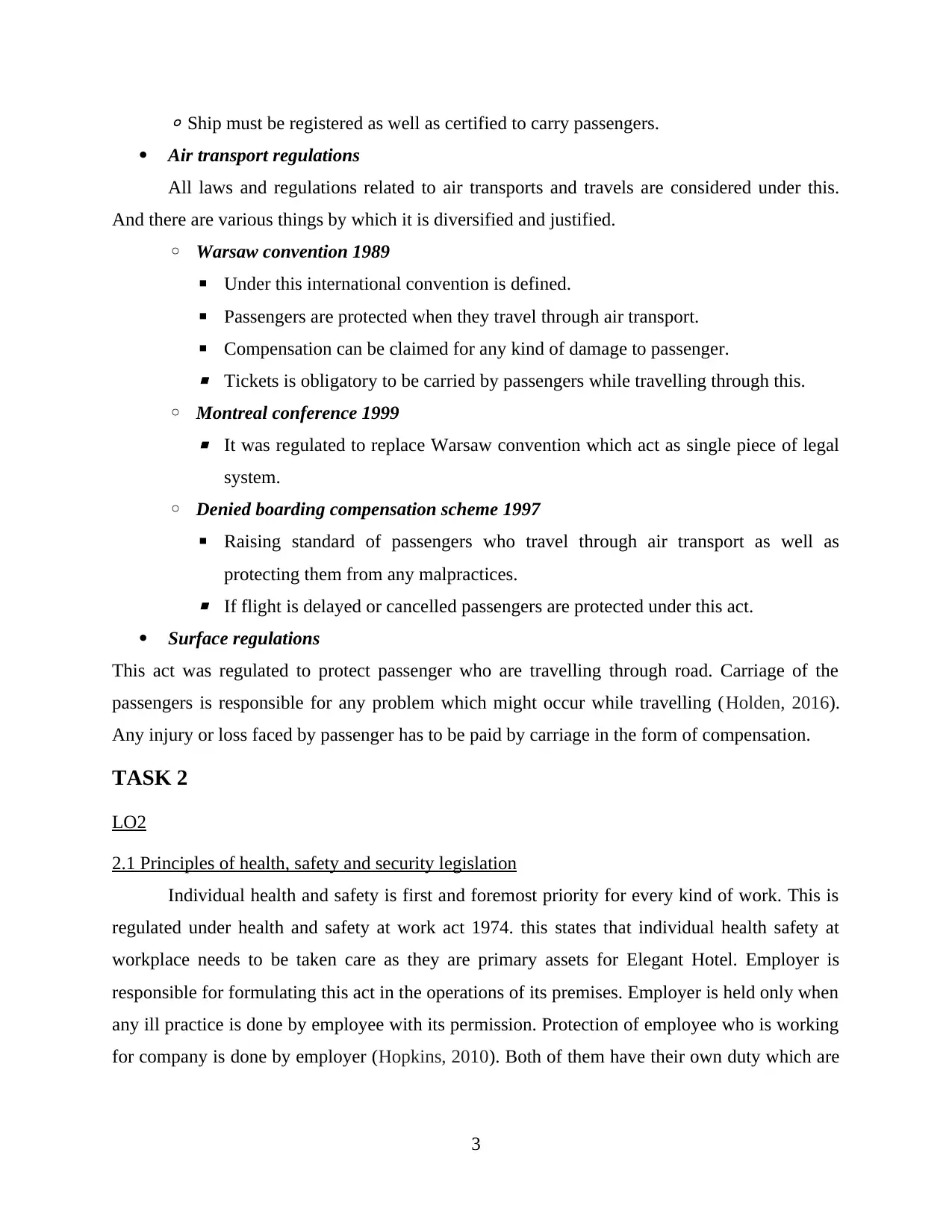
◦ Ship must be registered as well as certified to carry passengers.
Air transport regulations
All laws and regulations related to air transports and travels are considered under this.
And there are various things by which it is diversified and justified.
◦ Warsaw convention 1989
▪ Under this international convention is defined.
▪ Passengers are protected when they travel through air transport.
▪ Compensation can be claimed for any kind of damage to passenger.
▪ Tickets is obligatory to be carried by passengers while travelling through this.
◦ Montreal conference 1999
▪ It was regulated to replace Warsaw convention which act as single piece of legal
system.
◦ Denied boarding compensation scheme 1997
▪ Raising standard of passengers who travel through air transport as well as
protecting them from any malpractices.
▪ If flight is delayed or cancelled passengers are protected under this act.
Surface regulations
This act was regulated to protect passenger who are travelling through road. Carriage of the
passengers is responsible for any problem which might occur while travelling (Holden, 2016).
Any injury or loss faced by passenger has to be paid by carriage in the form of compensation.
TASK 2
LO2
2.1 Principles of health, safety and security legislation
Individual health and safety is first and foremost priority for every kind of work. This is
regulated under health and safety at work act 1974. this states that individual health safety at
workplace needs to be taken care as they are primary assets for Elegant Hotel. Employer is
responsible for formulating this act in the operations of its premises. Employer is held only when
any ill practice is done by employee with its permission. Protection of employee who is working
for company is done by employer (Hopkins, 2010). Both of them have their own duty which are
3
Air transport regulations
All laws and regulations related to air transports and travels are considered under this.
And there are various things by which it is diversified and justified.
◦ Warsaw convention 1989
▪ Under this international convention is defined.
▪ Passengers are protected when they travel through air transport.
▪ Compensation can be claimed for any kind of damage to passenger.
▪ Tickets is obligatory to be carried by passengers while travelling through this.
◦ Montreal conference 1999
▪ It was regulated to replace Warsaw convention which act as single piece of legal
system.
◦ Denied boarding compensation scheme 1997
▪ Raising standard of passengers who travel through air transport as well as
protecting them from any malpractices.
▪ If flight is delayed or cancelled passengers are protected under this act.
Surface regulations
This act was regulated to protect passenger who are travelling through road. Carriage of the
passengers is responsible for any problem which might occur while travelling (Holden, 2016).
Any injury or loss faced by passenger has to be paid by carriage in the form of compensation.
TASK 2
LO2
2.1 Principles of health, safety and security legislation
Individual health and safety is first and foremost priority for every kind of work. This is
regulated under health and safety at work act 1974. this states that individual health safety at
workplace needs to be taken care as they are primary assets for Elegant Hotel. Employer is
responsible for formulating this act in the operations of its premises. Employer is held only when
any ill practice is done by employee with its permission. Protection of employee who is working
for company is done by employer (Hopkins, 2010). Both of them have their own duty which are
3
⊘ This is a preview!⊘
Do you want full access?
Subscribe today to unlock all pages.

Trusted by 1+ million students worldwide
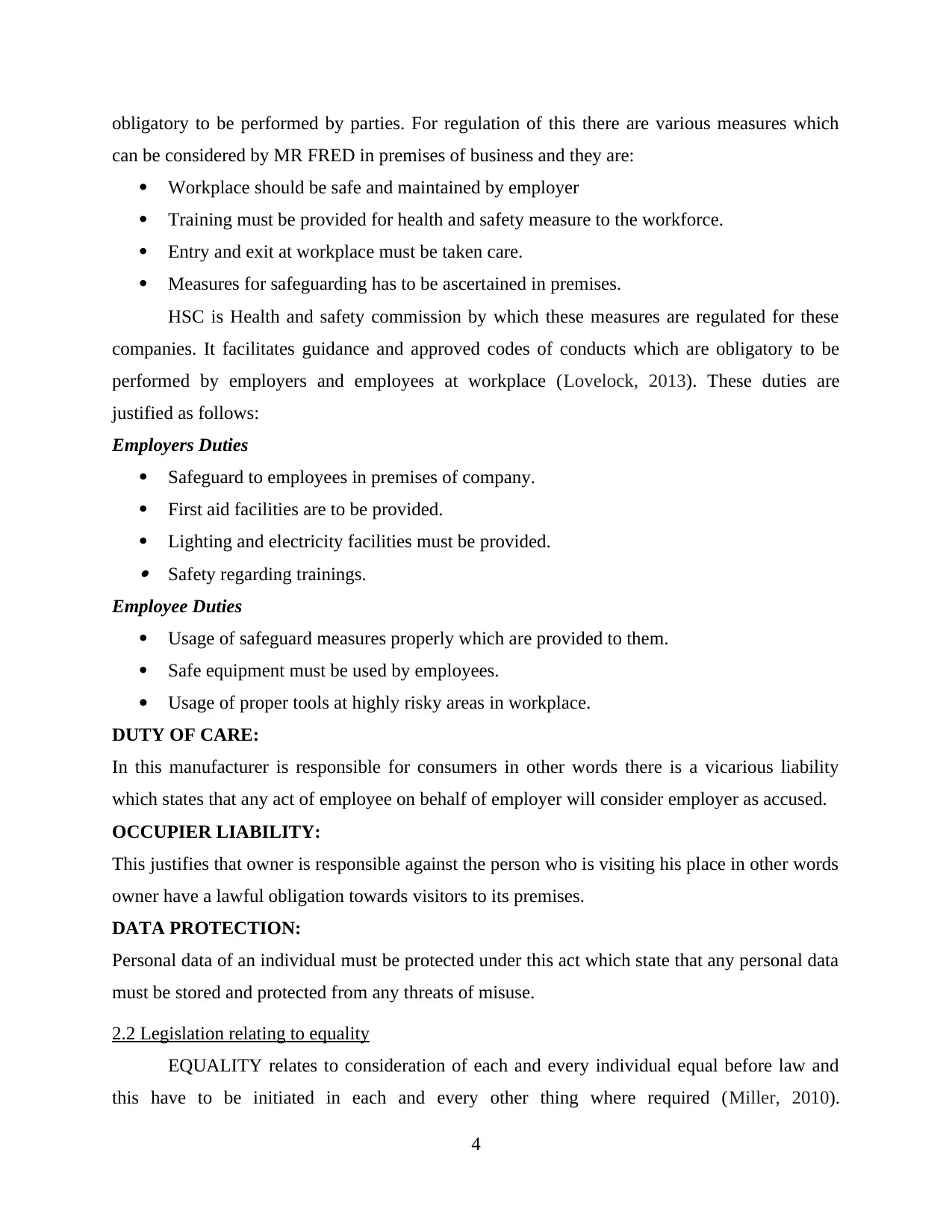
obligatory to be performed by parties. For regulation of this there are various measures which
can be considered by MR FRED in premises of business and they are:
Workplace should be safe and maintained by employer
Training must be provided for health and safety measure to the workforce.
Entry and exit at workplace must be taken care.
Measures for safeguarding has to be ascertained in premises.
HSC is Health and safety commission by which these measures are regulated for these
companies. It facilitates guidance and approved codes of conducts which are obligatory to be
performed by employers and employees at workplace (Lovelock, 2013). These duties are
justified as follows:
Employers Duties
Safeguard to employees in premises of company.
First aid facilities are to be provided.
Lighting and electricity facilities must be provided. Safety regarding trainings.
Employee Duties
Usage of safeguard measures properly which are provided to them.
Safe equipment must be used by employees.
Usage of proper tools at highly risky areas in workplace.
DUTY OF CARE:
In this manufacturer is responsible for consumers in other words there is a vicarious liability
which states that any act of employee on behalf of employer will consider employer as accused.
OCCUPIER LIABILITY:
This justifies that owner is responsible against the person who is visiting his place in other words
owner have a lawful obligation towards visitors to its premises.
DATA PROTECTION:
Personal data of an individual must be protected under this act which state that any personal data
must be stored and protected from any threats of misuse.
2.2 Legislation relating to equality
EQUALITY relates to consideration of each and every individual equal before law and
this have to be initiated in each and every other thing where required (Miller, 2010).
4
can be considered by MR FRED in premises of business and they are:
Workplace should be safe and maintained by employer
Training must be provided for health and safety measure to the workforce.
Entry and exit at workplace must be taken care.
Measures for safeguarding has to be ascertained in premises.
HSC is Health and safety commission by which these measures are regulated for these
companies. It facilitates guidance and approved codes of conducts which are obligatory to be
performed by employers and employees at workplace (Lovelock, 2013). These duties are
justified as follows:
Employers Duties
Safeguard to employees in premises of company.
First aid facilities are to be provided.
Lighting and electricity facilities must be provided. Safety regarding trainings.
Employee Duties
Usage of safeguard measures properly which are provided to them.
Safe equipment must be used by employees.
Usage of proper tools at highly risky areas in workplace.
DUTY OF CARE:
In this manufacturer is responsible for consumers in other words there is a vicarious liability
which states that any act of employee on behalf of employer will consider employer as accused.
OCCUPIER LIABILITY:
This justifies that owner is responsible against the person who is visiting his place in other words
owner have a lawful obligation towards visitors to its premises.
DATA PROTECTION:
Personal data of an individual must be protected under this act which state that any personal data
must be stored and protected from any threats of misuse.
2.2 Legislation relating to equality
EQUALITY relates to consideration of each and every individual equal before law and
this have to be initiated in each and every other thing where required (Miller, 2010).
4
Paraphrase This Document
Need a fresh take? Get an instant paraphrase of this document with our AI Paraphraser
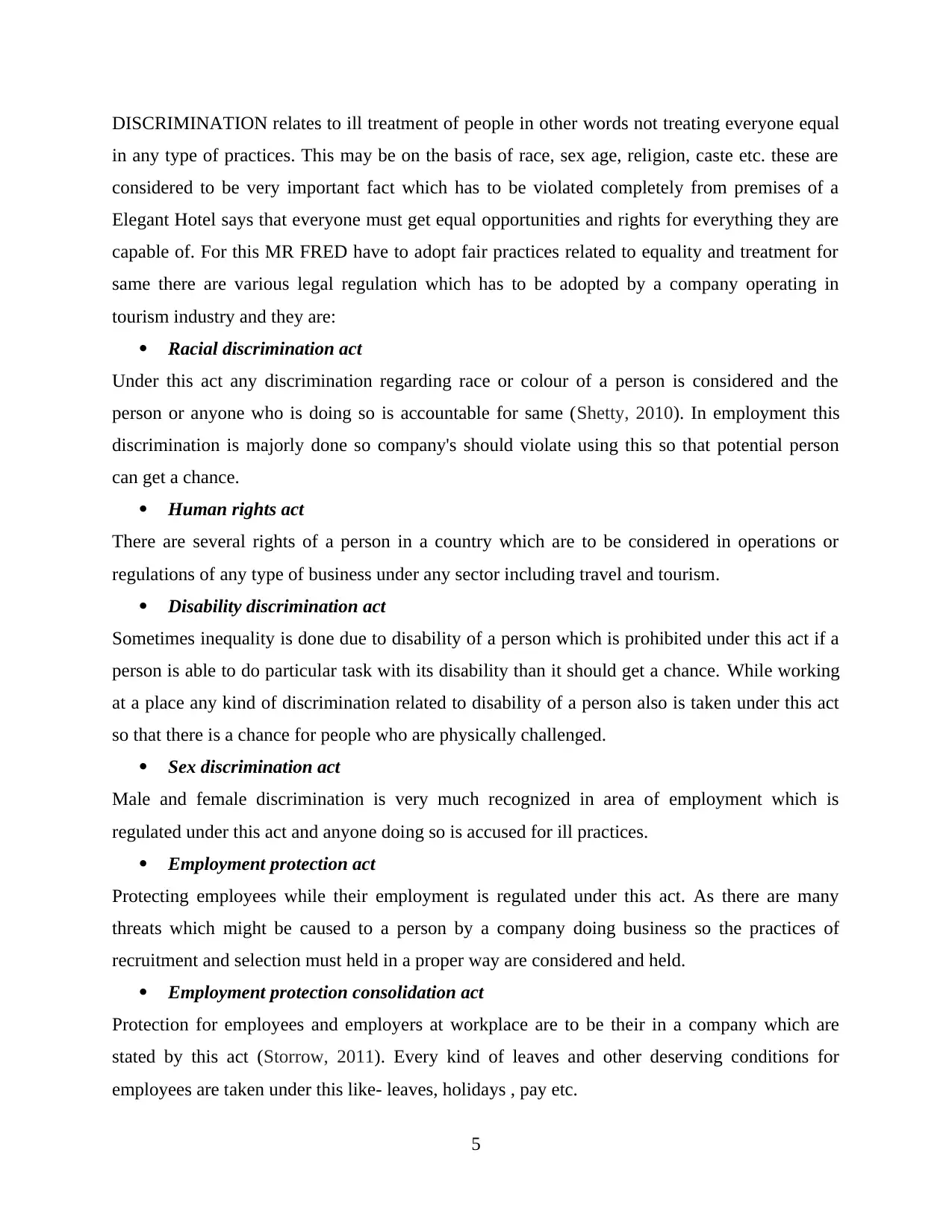
DISCRIMINATION relates to ill treatment of people in other words not treating everyone equal
in any type of practices. This may be on the basis of race, sex age, religion, caste etc. these are
considered to be very important fact which has to be violated completely from premises of a
Elegant Hotel says that everyone must get equal opportunities and rights for everything they are
capable of. For this MR FRED have to adopt fair practices related to equality and treatment for
same there are various legal regulation which has to be adopted by a company operating in
tourism industry and they are:
Racial discrimination act
Under this act any discrimination regarding race or colour of a person is considered and the
person or anyone who is doing so is accountable for same (Shetty, 2010). In employment this
discrimination is majorly done so company's should violate using this so that potential person
can get a chance.
Human rights act
There are several rights of a person in a country which are to be considered in operations or
regulations of any type of business under any sector including travel and tourism.
Disability discrimination act
Sometimes inequality is done due to disability of a person which is prohibited under this act if a
person is able to do particular task with its disability than it should get a chance. While working
at a place any kind of discrimination related to disability of a person also is taken under this act
so that there is a chance for people who are physically challenged.
Sex discrimination act
Male and female discrimination is very much recognized in area of employment which is
regulated under this act and anyone doing so is accused for ill practices.
Employment protection act
Protecting employees while their employment is regulated under this act. As there are many
threats which might be caused to a person by a company doing business so the practices of
recruitment and selection must held in a proper way are considered and held.
Employment protection consolidation act
Protection for employees and employers at workplace are to be their in a company which are
stated by this act (Storrow, 2011). Every kind of leaves and other deserving conditions for
employees are taken under this like- leaves, holidays , pay etc.
5
in any type of practices. This may be on the basis of race, sex age, religion, caste etc. these are
considered to be very important fact which has to be violated completely from premises of a
Elegant Hotel says that everyone must get equal opportunities and rights for everything they are
capable of. For this MR FRED have to adopt fair practices related to equality and treatment for
same there are various legal regulation which has to be adopted by a company operating in
tourism industry and they are:
Racial discrimination act
Under this act any discrimination regarding race or colour of a person is considered and the
person or anyone who is doing so is accountable for same (Shetty, 2010). In employment this
discrimination is majorly done so company's should violate using this so that potential person
can get a chance.
Human rights act
There are several rights of a person in a country which are to be considered in operations or
regulations of any type of business under any sector including travel and tourism.
Disability discrimination act
Sometimes inequality is done due to disability of a person which is prohibited under this act if a
person is able to do particular task with its disability than it should get a chance. While working
at a place any kind of discrimination related to disability of a person also is taken under this act
so that there is a chance for people who are physically challenged.
Sex discrimination act
Male and female discrimination is very much recognized in area of employment which is
regulated under this act and anyone doing so is accused for ill practices.
Employment protection act
Protecting employees while their employment is regulated under this act. As there are many
threats which might be caused to a person by a company doing business so the practices of
recruitment and selection must held in a proper way are considered and held.
Employment protection consolidation act
Protection for employees and employers at workplace are to be their in a company which are
stated by this act (Storrow, 2011). Every kind of leaves and other deserving conditions for
employees are taken under this like- leaves, holidays , pay etc.
5
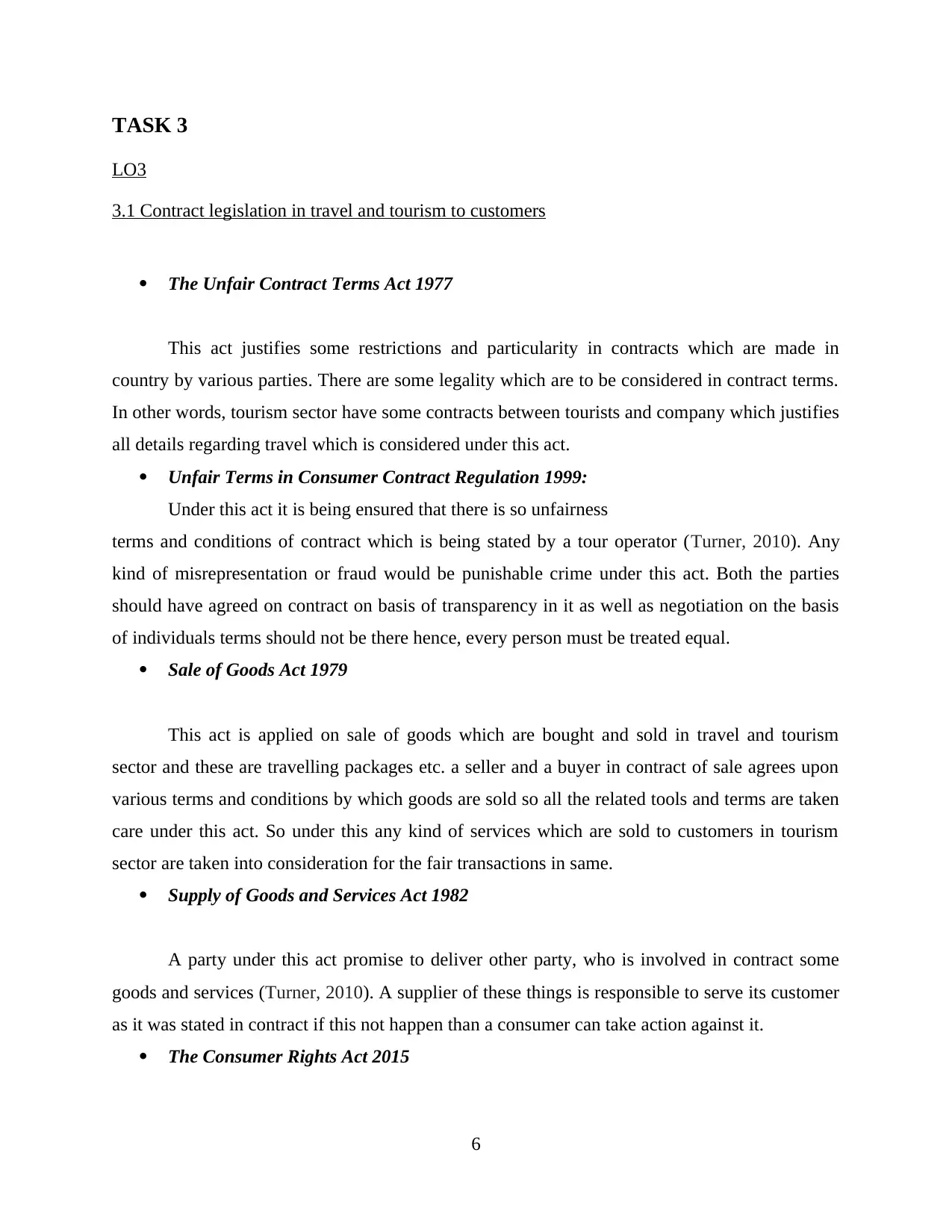
TASK 3
LO3
3.1 Contract legislation in travel and tourism to customers
The Unfair Contract Terms Act 1977
This act justifies some restrictions and particularity in contracts which are made in
country by various parties. There are some legality which are to be considered in contract terms.
In other words, tourism sector have some contracts between tourists and company which justifies
all details regarding travel which is considered under this act.
Unfair Terms in Consumer Contract Regulation 1999:
Under this act it is being ensured that there is so unfairness
terms and conditions of contract which is being stated by a tour operator (Turner, 2010). Any
kind of misrepresentation or fraud would be punishable crime under this act. Both the parties
should have agreed on contract on basis of transparency in it as well as negotiation on the basis
of individuals terms should not be there hence, every person must be treated equal.
Sale of Goods Act 1979
This act is applied on sale of goods which are bought and sold in travel and tourism
sector and these are travelling packages etc. a seller and a buyer in contract of sale agrees upon
various terms and conditions by which goods are sold so all the related tools and terms are taken
care under this act. So under this any kind of services which are sold to customers in tourism
sector are taken into consideration for the fair transactions in same.
Supply of Goods and Services Act 1982
A party under this act promise to deliver other party, who is involved in contract some
goods and services (Turner, 2010). A supplier of these things is responsible to serve its customer
as it was stated in contract if this not happen than a consumer can take action against it.
The Consumer Rights Act 2015
6
LO3
3.1 Contract legislation in travel and tourism to customers
The Unfair Contract Terms Act 1977
This act justifies some restrictions and particularity in contracts which are made in
country by various parties. There are some legality which are to be considered in contract terms.
In other words, tourism sector have some contracts between tourists and company which justifies
all details regarding travel which is considered under this act.
Unfair Terms in Consumer Contract Regulation 1999:
Under this act it is being ensured that there is so unfairness
terms and conditions of contract which is being stated by a tour operator (Turner, 2010). Any
kind of misrepresentation or fraud would be punishable crime under this act. Both the parties
should have agreed on contract on basis of transparency in it as well as negotiation on the basis
of individuals terms should not be there hence, every person must be treated equal.
Sale of Goods Act 1979
This act is applied on sale of goods which are bought and sold in travel and tourism
sector and these are travelling packages etc. a seller and a buyer in contract of sale agrees upon
various terms and conditions by which goods are sold so all the related tools and terms are taken
care under this act. So under this any kind of services which are sold to customers in tourism
sector are taken into consideration for the fair transactions in same.
Supply of Goods and Services Act 1982
A party under this act promise to deliver other party, who is involved in contract some
goods and services (Turner, 2010). A supplier of these things is responsible to serve its customer
as it was stated in contract if this not happen than a consumer can take action against it.
The Consumer Rights Act 2015
6
⊘ This is a preview!⊘
Do you want full access?
Subscribe today to unlock all pages.

Trusted by 1+ million students worldwide
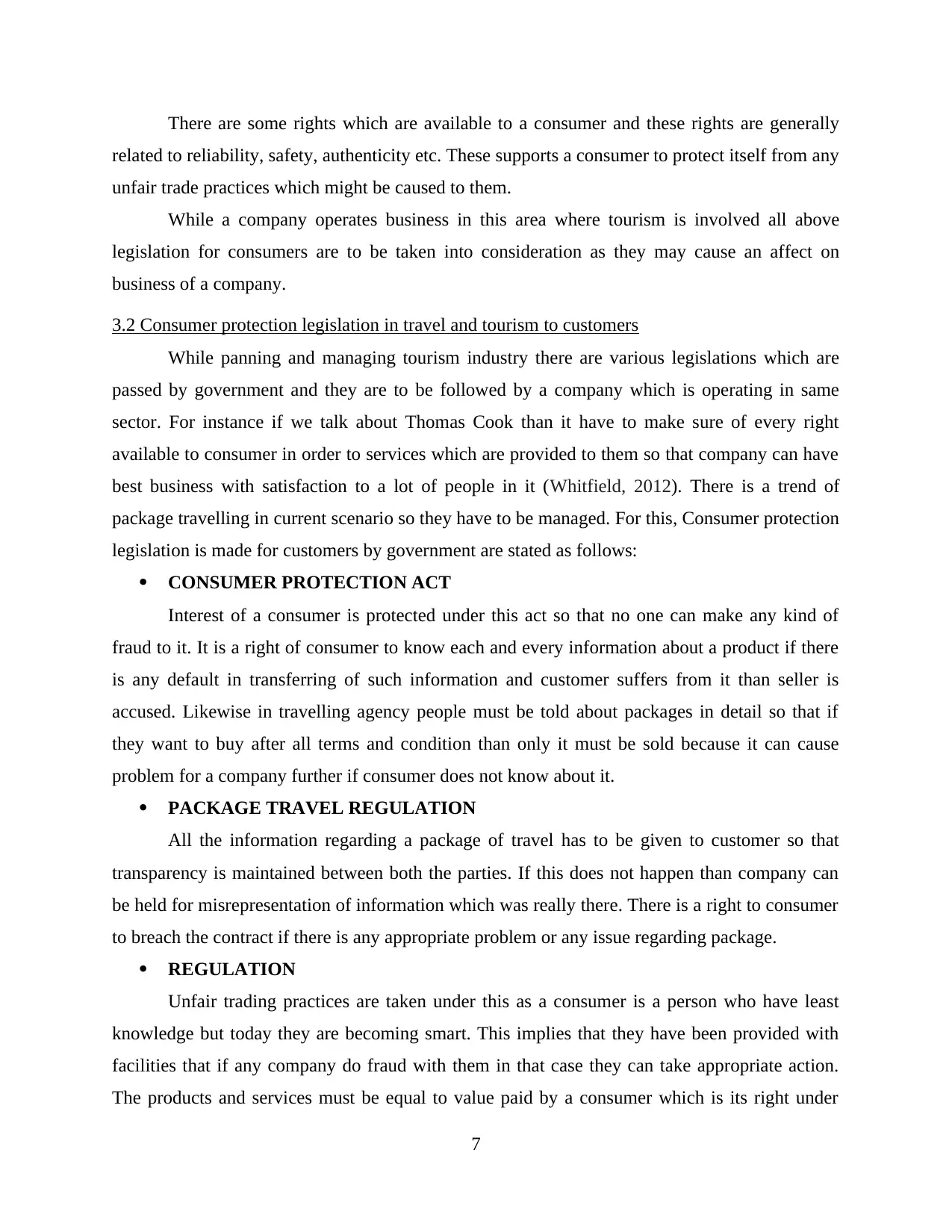
There are some rights which are available to a consumer and these rights are generally
related to reliability, safety, authenticity etc. These supports a consumer to protect itself from any
unfair trade practices which might be caused to them.
While a company operates business in this area where tourism is involved all above
legislation for consumers are to be taken into consideration as they may cause an affect on
business of a company.
3.2 Consumer protection legislation in travel and tourism to customers
While panning and managing tourism industry there are various legislations which are
passed by government and they are to be followed by a company which is operating in same
sector. For instance if we talk about Thomas Cook than it have to make sure of every right
available to consumer in order to services which are provided to them so that company can have
best business with satisfaction to a lot of people in it (Whitfield, 2012). There is a trend of
package travelling in current scenario so they have to be managed. For this, Consumer protection
legislation is made for customers by government are stated as follows:
CONSUMER PROTECTION ACT
Interest of a consumer is protected under this act so that no one can make any kind of
fraud to it. It is a right of consumer to know each and every information about a product if there
is any default in transferring of such information and customer suffers from it than seller is
accused. Likewise in travelling agency people must be told about packages in detail so that if
they want to buy after all terms and condition than only it must be sold because it can cause
problem for a company further if consumer does not know about it.
PACKAGE TRAVEL REGULATION
All the information regarding a package of travel has to be given to customer so that
transparency is maintained between both the parties. If this does not happen than company can
be held for misrepresentation of information which was really there. There is a right to consumer
to breach the contract if there is any appropriate problem or any issue regarding package.
REGULATION
Unfair trading practices are taken under this as a consumer is a person who have least
knowledge but today they are becoming smart. This implies that they have been provided with
facilities that if any company do fraud with them in that case they can take appropriate action.
The products and services must be equal to value paid by a consumer which is its right under
7
related to reliability, safety, authenticity etc. These supports a consumer to protect itself from any
unfair trade practices which might be caused to them.
While a company operates business in this area where tourism is involved all above
legislation for consumers are to be taken into consideration as they may cause an affect on
business of a company.
3.2 Consumer protection legislation in travel and tourism to customers
While panning and managing tourism industry there are various legislations which are
passed by government and they are to be followed by a company which is operating in same
sector. For instance if we talk about Thomas Cook than it have to make sure of every right
available to consumer in order to services which are provided to them so that company can have
best business with satisfaction to a lot of people in it (Whitfield, 2012). There is a trend of
package travelling in current scenario so they have to be managed. For this, Consumer protection
legislation is made for customers by government are stated as follows:
CONSUMER PROTECTION ACT
Interest of a consumer is protected under this act so that no one can make any kind of
fraud to it. It is a right of consumer to know each and every information about a product if there
is any default in transferring of such information and customer suffers from it than seller is
accused. Likewise in travelling agency people must be told about packages in detail so that if
they want to buy after all terms and condition than only it must be sold because it can cause
problem for a company further if consumer does not know about it.
PACKAGE TRAVEL REGULATION
All the information regarding a package of travel has to be given to customer so that
transparency is maintained between both the parties. If this does not happen than company can
be held for misrepresentation of information which was really there. There is a right to consumer
to breach the contract if there is any appropriate problem or any issue regarding package.
REGULATION
Unfair trading practices are taken under this as a consumer is a person who have least
knowledge but today they are becoming smart. This implies that they have been provided with
facilities that if any company do fraud with them in that case they can take appropriate action.
The products and services must be equal to value paid by a consumer which is its right under
7
Paraphrase This Document
Need a fresh take? Get an instant paraphrase of this document with our AI Paraphraser
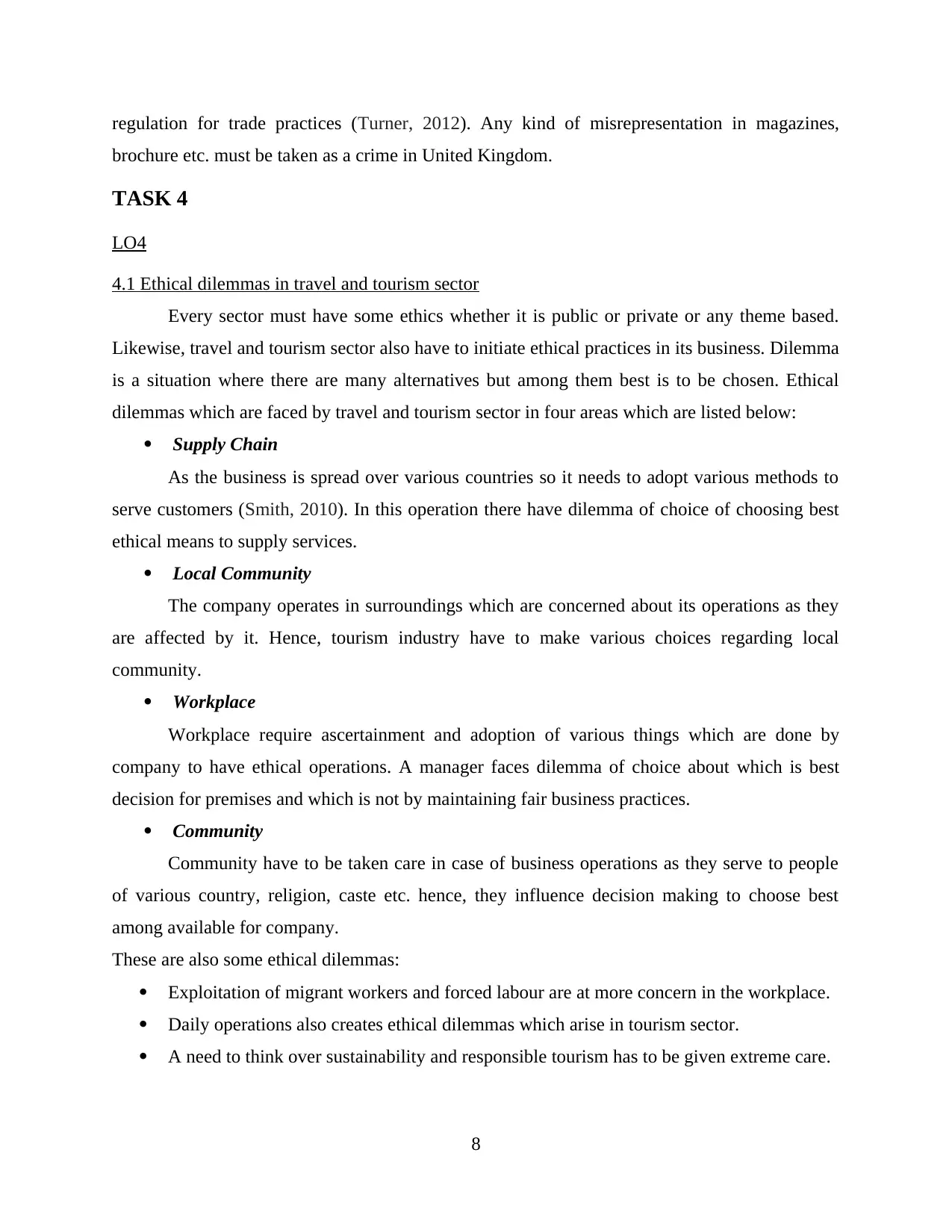
regulation for trade practices (Turner, 2012). Any kind of misrepresentation in magazines,
brochure etc. must be taken as a crime in United Kingdom.
TASK 4
LO4
4.1 Ethical dilemmas in travel and tourism sector
Every sector must have some ethics whether it is public or private or any theme based.
Likewise, travel and tourism sector also have to initiate ethical practices in its business. Dilemma
is a situation where there are many alternatives but among them best is to be chosen. Ethical
dilemmas which are faced by travel and tourism sector in four areas which are listed below:
Supply Chain
As the business is spread over various countries so it needs to adopt various methods to
serve customers (Smith, 2010). In this operation there have dilemma of choice of choosing best
ethical means to supply services.
Local Community
The company operates in surroundings which are concerned about its operations as they
are affected by it. Hence, tourism industry have to make various choices regarding local
community.
Workplace
Workplace require ascertainment and adoption of various things which are done by
company to have ethical operations. A manager faces dilemma of choice about which is best
decision for premises and which is not by maintaining fair business practices.
Community
Community have to be taken care in case of business operations as they serve to people
of various country, religion, caste etc. hence, they influence decision making to choose best
among available for company.
These are also some ethical dilemmas:
Exploitation of migrant workers and forced labour are at more concern in the workplace.
Daily operations also creates ethical dilemmas which arise in tourism sector.
A need to think over sustainability and responsible tourism has to be given extreme care.
8
brochure etc. must be taken as a crime in United Kingdom.
TASK 4
LO4
4.1 Ethical dilemmas in travel and tourism sector
Every sector must have some ethics whether it is public or private or any theme based.
Likewise, travel and tourism sector also have to initiate ethical practices in its business. Dilemma
is a situation where there are many alternatives but among them best is to be chosen. Ethical
dilemmas which are faced by travel and tourism sector in four areas which are listed below:
Supply Chain
As the business is spread over various countries so it needs to adopt various methods to
serve customers (Smith, 2010). In this operation there have dilemma of choice of choosing best
ethical means to supply services.
Local Community
The company operates in surroundings which are concerned about its operations as they
are affected by it. Hence, tourism industry have to make various choices regarding local
community.
Workplace
Workplace require ascertainment and adoption of various things which are done by
company to have ethical operations. A manager faces dilemma of choice about which is best
decision for premises and which is not by maintaining fair business practices.
Community
Community have to be taken care in case of business operations as they serve to people
of various country, religion, caste etc. hence, they influence decision making to choose best
among available for company.
These are also some ethical dilemmas:
Exploitation of migrant workers and forced labour are at more concern in the workplace.
Daily operations also creates ethical dilemmas which arise in tourism sector.
A need to think over sustainability and responsible tourism has to be given extreme care.
8
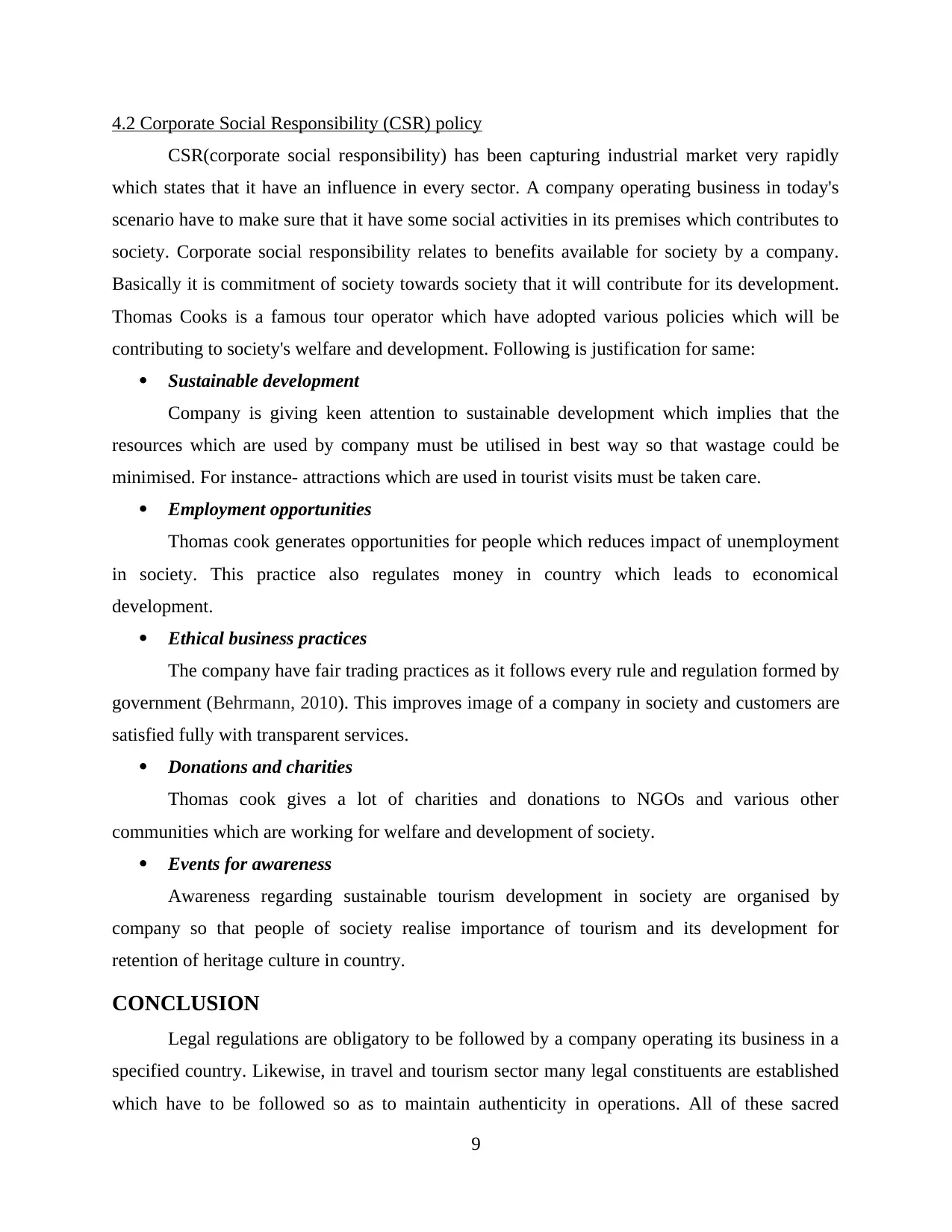
4.2 Corporate Social Responsibility (CSR) policy
CSR(corporate social responsibility) has been capturing industrial market very rapidly
which states that it have an influence in every sector. A company operating business in today's
scenario have to make sure that it have some social activities in its premises which contributes to
society. Corporate social responsibility relates to benefits available for society by a company.
Basically it is commitment of society towards society that it will contribute for its development.
Thomas Cooks is a famous tour operator which have adopted various policies which will be
contributing to society's welfare and development. Following is justification for same:
Sustainable development
Company is giving keen attention to sustainable development which implies that the
resources which are used by company must be utilised in best way so that wastage could be
minimised. For instance- attractions which are used in tourist visits must be taken care.
Employment opportunities
Thomas cook generates opportunities for people which reduces impact of unemployment
in society. This practice also regulates money in country which leads to economical
development.
Ethical business practices
The company have fair trading practices as it follows every rule and regulation formed by
government (Behrmann, 2010). This improves image of a company in society and customers are
satisfied fully with transparent services.
Donations and charities
Thomas cook gives a lot of charities and donations to NGOs and various other
communities which are working for welfare and development of society.
Events for awareness
Awareness regarding sustainable tourism development in society are organised by
company so that people of society realise importance of tourism and its development for
retention of heritage culture in country.
CONCLUSION
Legal regulations are obligatory to be followed by a company operating its business in a
specified country. Likewise, in travel and tourism sector many legal constituents are established
which have to be followed so as to maintain authenticity in operations. All of these sacred
9
CSR(corporate social responsibility) has been capturing industrial market very rapidly
which states that it have an influence in every sector. A company operating business in today's
scenario have to make sure that it have some social activities in its premises which contributes to
society. Corporate social responsibility relates to benefits available for society by a company.
Basically it is commitment of society towards society that it will contribute for its development.
Thomas Cooks is a famous tour operator which have adopted various policies which will be
contributing to society's welfare and development. Following is justification for same:
Sustainable development
Company is giving keen attention to sustainable development which implies that the
resources which are used by company must be utilised in best way so that wastage could be
minimised. For instance- attractions which are used in tourist visits must be taken care.
Employment opportunities
Thomas cook generates opportunities for people which reduces impact of unemployment
in society. This practice also regulates money in country which leads to economical
development.
Ethical business practices
The company have fair trading practices as it follows every rule and regulation formed by
government (Behrmann, 2010). This improves image of a company in society and customers are
satisfied fully with transparent services.
Donations and charities
Thomas cook gives a lot of charities and donations to NGOs and various other
communities which are working for welfare and development of society.
Events for awareness
Awareness regarding sustainable tourism development in society are organised by
company so that people of society realise importance of tourism and its development for
retention of heritage culture in country.
CONCLUSION
Legal regulations are obligatory to be followed by a company operating its business in a
specified country. Likewise, in travel and tourism sector many legal constituents are established
which have to be followed so as to maintain authenticity in operations. All of these sacred
9
⊘ This is a preview!⊘
Do you want full access?
Subscribe today to unlock all pages.

Trusted by 1+ million students worldwide
1 out of 14
Related Documents
Your All-in-One AI-Powered Toolkit for Academic Success.
+13062052269
info@desklib.com
Available 24*7 on WhatsApp / Email
![[object Object]](/_next/static/media/star-bottom.7253800d.svg)
Unlock your academic potential
Copyright © 2020–2026 A2Z Services. All Rights Reserved. Developed and managed by ZUCOL.




